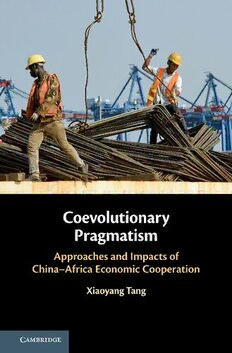Table Of ContentCoevolutionary Pragmatism
TheChina-Africaeconomictiehasexperiencedlastingrapidgrowthsince
the 2000s, attracting lots of discussion on its nature and effects. A key
questioniswhetherChineseengagementsprovideanalternativeparadigm
to existing mainstream models, such as Washington Consensus, for
developing countries. However, theories on state–market dichotomy can
hardly explain the strong momentum of bilateral cooperation. By
examining a broad range of practices with solid field research, including
trade, infrastructure, agriculture, manufacturing, industrial zones, labor,
andsocioenvironmental preservation,this bookproposesa newangleof
nonlinear circular causality to understand Chinese approaches to work
withAfrica.Guidedbythepursuitforsustainablegrowthratherthanby
specificmodels,Chineseactorsareabletoexperimentdiversemethodsto
foster structural transformation in Africa. In particular, the author
carefully records mutual influences between Chinese and African
stakeholders at all levels, from grassroots to policymaking, to illustrate
theeffectsofcoevolvingindustrialization.
xiaoyang tang is an associate professor in the Department of
InternationalRelationsatTsinghuaUniversityanddeputydirectoratthe
Carnegie-TsinghuaCenterforGlobalPolicy.Hisresearchinterestsinclude
politicalphilosophy,China’sengagementinAfrica,andthemodernization
process of the developing countries. He is the author of China-Africa
Economic Diplomacy (2014 in Chinese) and has published extensively
on Asia-Africa relations. He completed his PhD in the philosophy
departmentattheNewSchoolforSocialResearchinNewYork.Healso
workedfortheWorldBank,USAID,IFPRI,andvariousresearchinstitutes
andconsultingcompanies.
Coevolutionary
Pragmatism
Approaches and Impacts of China-Africa
Economic Cooperation
xiaoyang tang
TsinghuaUniversity,Beijing
UniversityPrintingHouse,CambridgeCB28BS,UnitedKingdom
OneLibertyPlaza,20thFloor,NewYork,NY10006,USA
477WilliamstownRoad,PortMelbourne,VIC3207,Australia
314–321,3rdFloor,Plot3,SplendorForum,JasolaDistrictCentre,
NewDelhi–110025,India
79AnsonRoad,#06–04/06,Singapore079906
CambridgeUniversityPressispartoftheUniversityofCambridge.
ItfurtherstheUniversity’smissionbydisseminatingknowledgeinthepursuitof
education,learning,andresearchatthehighestinternationallevelsofexcellence.
www.cambridge.org
Informationonthistitle:www.cambridge.org/9781108415293
DOI:10.1017/9781108233118
©XiaoyangTang2020
Thispublicationisincopyright.Subjecttostatutoryexception
andtotheprovisionsofrelevantcollectivelicensingagreements,
noreproductionofanypartmaytakeplacewithoutthewritten
permissionofCambridgeUniversityPress.
Firstpublished2020
AcataloguerecordforthispublicationisavailablefromtheBritishLibrary.
LibraryofCongressCataloging-in-PublicationData
Names:Tang,Xiaoyang,author.
Title:Coevolutionarypragmatism:approachesandimpactsofChina-Africa
economiccooperation/XiaoyangTang,TsinghuaUniversity,Beijing.
Description:Cambridge,UnitedKingdom;NewYork,NY:CambridgeUniversity
Press,2020.|Includesbibliographicalreferencesandindex.
Identifiers:LCCN2020026280(print)|LCCN2020026281(ebook)|ISBN
9781108415293(hardback)|ISBN9781108233118(ebook)
Subjects:LCSH:China–Foreigneconomicrelations–Africa.|Africa–Foreign
economicrelations–China.|China–Commerce–Africa.|Africa–Commerce–
China.|Economicdevelopment–Africa.|Economicdevelopment–China.
Classification:LCCHF1604.Z4A35782020(print)|LCCHF1604.Z4(ebook)|
DDC337.5106–dc23
LCrecordavailableathttps://lccn.loc.gov/2020026280
LCebookrecordavailableathttps://lccn.loc.gov/2020026281
ISBN978-1-108-41529-3Hardback
CambridgeUniversityPresshasnoresponsibilityforthepersistenceoraccuracyof
URLsforexternalorthird-partyinternetwebsitesreferredtointhispublication
anddoesnotguaranteethatanycontentonsuchwebsitesis,orwillremain,
accurateorappropriate.
Formyparents
Contents
ListofFigures pageix
ListofTables xi
Preface xiii
ForewordbyDeborahBrautigam xvii
ListofAbbreviations xx
1 A“Model”withNoModel 1
1.1 TheDrivingForcesBehindChina-AfricaEngagement 1
1.2 LackoftheBeijingConsensus 7
1.3 EvolutionofChina-AfricaPragmatism 14
1.4 PragmatisminStructuralTransformation 23
1.5 SolvetheChicken-and-EggDilemma 33
2 Trade 45
2.1 TheChineseStoryofAfricanMarkets 45
2.2 “BadQuality”:ADouble-SidedCoin 52
2.3 Dilemmaof“MarketActiveness”and“Regulation” 57
2.4 TheChallengeofTradeStructure 63
2.5 AfricanExportstoChina 68
3 Infrastructure 74
3.1 ReflectionsontheTan-ZamRailway 74
3.2 ThePredicamentofAfricanInfrastructure 82
3.3 DilemmaofPublicandCommercialInterests 87
3.4 Fromthe“AngolaModel”totheAddisAbaba-Djibouti
Railway 93
4 Agriculture 102
4.1 HopeandHardshipintheCottonFields 102
4.2 DilemmaofSubsistenceFarmingandAgricultural
Modernization 107
4.3 FromAidtoBusiness 112
4.4 EarthboundEntrepreneurs 122
vii
viii Contents
5 Manufacturing 130
5.1 ABeaconintheWilderness 130
5.2 TheRockyPathofManufacturing 136
5.3 DilemmaoftheValueChain 143
5.4 BuildingLocalLinkages 152
5.5 CoevolutionBetweenIndustryandMarket 160
6 SpecialEconomicZones 169
6.1 FromaDeserttoaCity 169
6.2 Attemptsto“GoGlobal” 173
6.3 DilemmaBetweenSpecialEconomicZones
andNationalStructuralTransformation 182
6.4 ChallengesfortheChina-AfricaCooperationZones 188
6.5 ApproachesTowardImprovedSynergism 196
7 EmploymentandTraining 203
7.1 ProletariatFriendshiporCapitalistExploitation? 203
7.2 TruthofEmploymentPractices 206
7.3 DilemmaBetweenWorkEthicsandIndustrialPractices 213
7.4 PragmaticApproachesTowardConvergence 222
8 SocialandEnvironmentalResponsibility 232
8.1 Water,Wind,andWildAnimals 232
8.2 ChineseEnterprises’EnvironmentalFootprintinAfrica 237
8.3 RegulatoryEffortsfromtheChineseSide 245
8.4 DilemmaBetweenEnvironmentalResponsibility
andDevelopmentResponsibility 250
Conclusion 259
ImplicationsofCoevolutionaryPragmatismintheChina-Africa
Relationship 259
ComparisonwiththeWesternApproaches 261
LinkagetoChina’sOwnDevelopment 263
DestinationofDevelopment 266
Index 269

